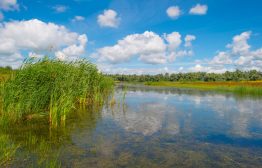Definition
noun
(physics) The passage of gases through fine tubes or through a porous substance.
(botany) The loss of water by evaporation in terrestrial plants, especially through the stomata (accompanied by a corresponding water uptake from the roots); a process in which the water vapor escapes through the plant via its stomata and lenticels into its external environment (atmosphere).
(animal physiology) The process of giving off water vapour through the skin or mucous membranes; also sometimes referred to as sweating, which is the evaporation of water together with a small amount of sodium chloride via the sweat glands of the skin.
Supplement
In plants, transpiration is important as it cools plants and enables mass flow of mineral nutrients and water from roots to shoots.
In animals, the process is sometimes called perspiration or sweating.
See also: evapotranspiration, perspiration.
Dictionary > Transpiration






